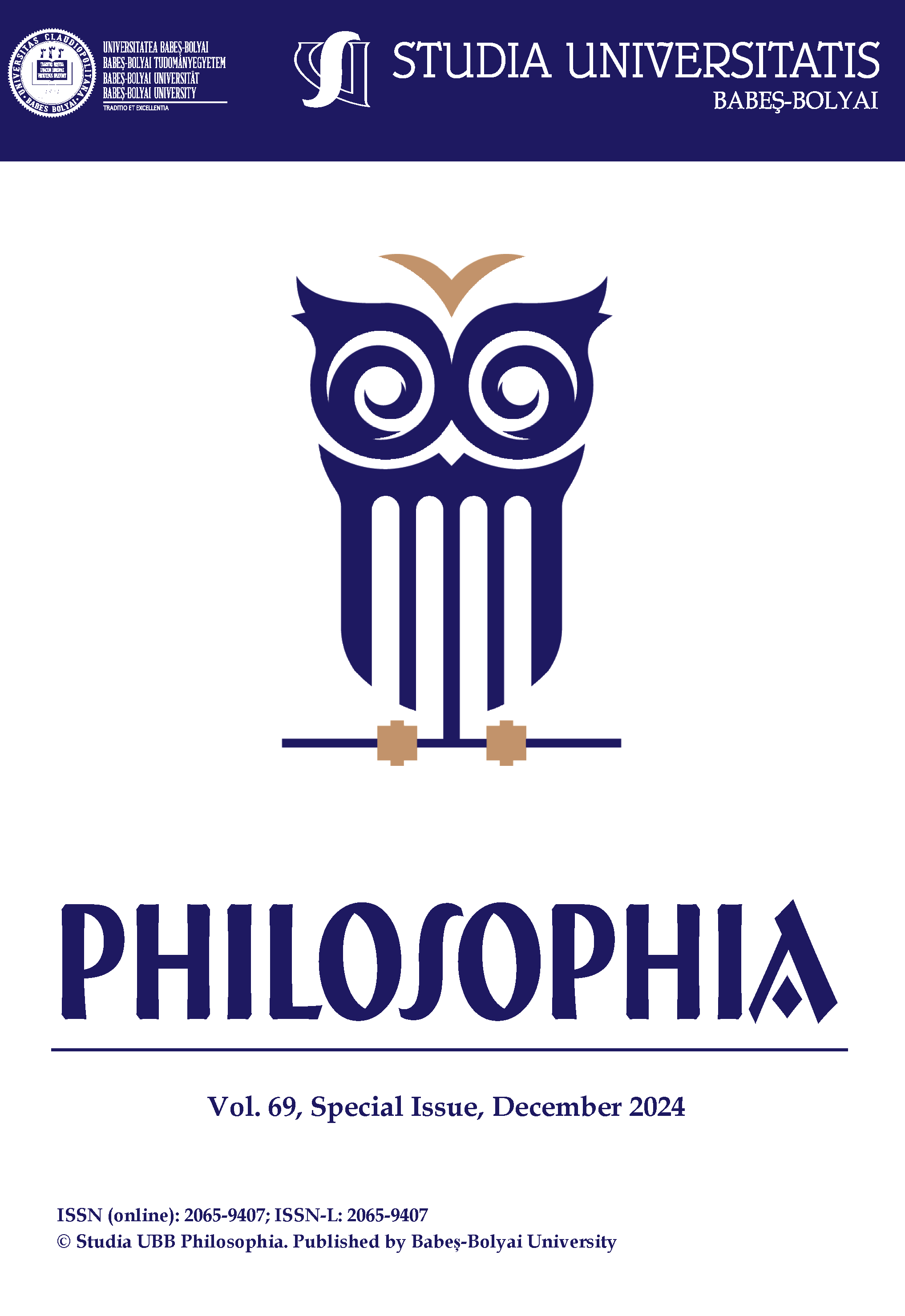Phenomenology and ontology in the thought of Edmund Husserl
DOI:
https://doi.org/10.24193/subbphil.2024.sp.iss.05Keywords:
“absolute”, continuum, time, phenomenology, ontology, transcendental “Absolute”, “absolute” Being, God, consciousness, “ultimately and truly absolute”, sich bekunden, real worldAbstract
In this paper I examine Husserlian phenomenology and its relations with a possible ontology that the great German philosopher cultivated as a project, an undeclared ontology. Husserl's expression of the “ultimately and truly absolute” as a “primeval source” is not explained by a declared ontology and the concept of the “continuum” is in the same situation.
Claiming that the roots of all ontologies seem to belong in phenomenology, Husserl appears to proclaim the uselessness of developing any ontology. The analysis of the possible development of the Husserlian concepts of “absolute” and “continuum” shows that it would have led Husserl either to an ontology or to the overcoming and dismantling of the phenomenology, because the Husserlian phenomenology and the ontology are actually incompatible. Perhaps that is exactly what he wanted to avoid.
The guiding thread of the text is that Husserlian phenomenology is not fully realized as an authentic philosophy without a declared ontology or a clear statement about the relations between phenomenology and ontology.
References
1. Dorion Cairns, Conversations with Husserl and Fink, Ed. Martinus Nijhoff / The Hague/ 1976
2. Albert Einstein, Relativity. The special and general theory, Ed. Signature Press Edition
3. Albert Einstein, Leopold Infeld, The Evolution of Physics, Ed. The Scientific Book Club III, Charing Cross Road, London, 1938
4. Stephen W. Hawking, A Brief History of Time from the Big Bang to Black Holes, Ed. Bantam Books, London, Toronto, Sydney, Auckland, Johannesburg, 2016
5. Edmund Husserl, Ideas. General Introduction to Pure Phenomenology, Ed. London and New York, 2012, Routledge
6. Edmund Husserl, Phenomenology and the Foundations of the Sciences. Third Book. Ideas Pertaining to a Pure Phenomenology and to a Phenomenological Philosophy, Ed. Martinus Nijhoff Publishers, 1980
7. Edmund Husserl, Philosophie als strenge Wissenschaft, Ed. Felix Meiner Verlag, Hamburg, 2009
8. Edmund Husserl, Zur Phanomenologie der Intersubjectivitat. Erster Teil 1905-1920, Ed. Den Haag, Martinus Nijhoff, 1973
9. Edmund Husserl, Ideen zu einer reinen Phänomenologie und phänomenologischen Philosophie, Erstes Buch, Ed. Felix Meiner Verlag, Hamburg, 2021
10. Edmund Husserl, The Phenomenology of Internal Time-Consciousness, Indiana University Press, 2019
11. Edmund Husserl, Idees directrices pour une phenomenologie et une philosophie phenomenologique pures, Livre Second, Puf 1982
12. Edmund Husserl, Experience and Judgment. Investigations in a Genealogy of Logic. Ed. Northwestern University Press, Evanston, 1973
13. Edmund Husserl, Die Krisis des europäischen Menschentums und die Philosophie, HUSSERLIANA, VI 195
14. Edmund Husserl, Cartesianische Meditationen, Ed. Felix Meiner Verlag, Hamburg, 2019
15. L. Landgrebe, Die Phänomenologie als transzendentale Theorie der Geschichte, in Phänomenologische Forschungen, hrsg. von der “Deutschen Geselschaft fṻr phänomenologische Forschung”, Bd. 3: Phänomenologie und Praxis, Verlag K. Alber Freiburg/ München, 1976
16. Claudio Tarditi, Rethinking Spatiotemporal Extension: Husserl’s Contribution to the Debate on the Continuum Hypothesis, Horizon 7 (1) 2018: I. Research: C. Tarditi: 141, Studies in Phenomenology, https://doi.org/10.21638/2226-5260-2018-7-1-137-159
17. Dan Zahavi, Husserl’s Phenomenology, Ed. Stanford University Press, Stanford, California, 2003
18. Dan Zahavi, Husserl and the “absolute”, Center for Subjectivity Research, University of Copenhagen, C. Ierna et al. (eds.), Philosophy, Phenomenology, Sciences, Phaenomenologica 200, DOI 10.1007/978-94-007-0071-0_4, © Springer Science+Business Media B.V. 2010
Downloads
Published
How to Cite
Issue
Section
License
Copyright (c) 2024 Studia Universitatis Babeș-Bolyai Philosophia

This work is licensed under a Creative Commons Attribution-NonCommercial-NoDerivatives 4.0 International License.



